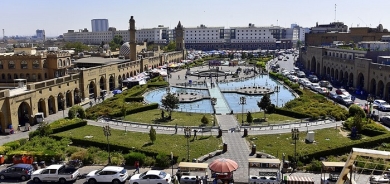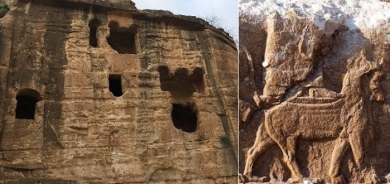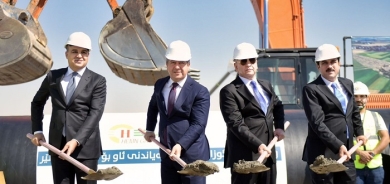Death toll on the rise as Syrian forces resume bombardment of Homs

Opposition campaigners said tank fire was concentrated on two large Sunni Muslim neighborhoods that have been at the forefront of opposition to Assad. They said scores of people were killed on Sunday after a lull in shelling the previous day. Al Arabiya put Sunday’s death toll at 36, including 15 in Deraa.
The government’s assault on Homs has spurred Arab countries to ostracize Assad and promise tougher action. At a meeting in Cairo on Sunday, Arab League foreign ministers pledged for the first time to aid the opposition battling to overthrow Assad.
The League also called on the U.N. Security Council to authorize a peacekeeping force, a challenge to Russia and China which have so far used their veto power to block action by the world body, most recently on Feb. 4.
In Homs, government troops concentrated their fire on Baba Amro neighborhood in the south of the city and al-Waer in the West, which borders the Military College, a main assembly point for tanks and government troops, opposition campaigners said.
“Tank shelling has been non-stop on Baba Amro amd the bombardment on al-Wear began overnight,” activist Mohammed al-Hassan told Reuters by phone.
He said al-Waer, scene of large pro-democracy demonstrations for months, had come under attack in the last several days from pro-Assad militia known as shabbiha.
“We heard that the Free Syrian Army has started responding by attacking roadblocks being manned by shabbiha. Communications with al-Waer have been cut off and the sound of shelling can be now heard,” Hassan said.
Opening communication channels
The Free Syrian Army, led by defectors, has taken the main role in armed opposition to Assad’s government. Accounts on the ground are difficult to verify because Syria restricts access by journalists.
The resolution approved by Arab League ministers in Cairo called for “opening communication channels with the Syrian opposition and providing all forms of political and material support to it,” a remarkable statement from a body once known for keeping out of the internal affairs of its members.
The Arab League has turned decisively against Assad, led by Saudi Arabia and other Sunni-ruled Gulf monarchies who have long resented Assad’s close ties to Shi'ite regional rival Iran.
The resolution did not spell out whether its proposed joint U.N.-Arab peacekeeping force would involve armed troops, or whether the aid offered to the opposition would include weapons.
If so, it would be the second time in less than a year the Arab League had called for outside intervention in an Arab state. Its decision to back a no-fly zone in Libya last March led to Western bombing that helped bring down Muammar Gaddafi.
Syria’s uprising, in which more than 6,000 people have died, has become one of the bloodiest of the Arab Spring revolts sweeping the region since the end of 2010.
Any peacekeeping mission would require consensus from foreign powers, who have been divided on how to resolve a conflict that is descending into a civil war.
Moscow and Beijing drew strong criticism from the West after they prevented the Security Council on Feb. 4 from backing an Arab plan that called for Assad to give up his powers. However, Western powers so far have shown no appetite for military action, despite their condemnation of the repression of the uprising.
Syria called the League’s resolution “a flagrant departure from the group's charter and a hostile act that targets Syria’s security and stability.” Assad’s government says it is fighting an insurgency by militants funded from abroad, and Arab states have turned against it as part of a regional power grab.
Friends of Syria
Earlier on Sunday, Tunisia said it would host the first meeting on Feb. 24 of a “Friends of Syria” contact group made up of Arab and other states and backed by the West. A similar Libya contact group played a vital role in coordinating Western and Arab aid to that country's rebels last year.
“The Syrian people deserve freedom as much as their brothers in Tunisia, Egypt, Libya and other Arab states that witnessed major political change,” Tunisian Foreign Minister Rafik Ben Abdul Salem told the ministers in Cairo.
On Sunday armor-backed troops raided the al-Inshaat district of Homs, which has seen several incursions by loyalist troops over the past week. Tanks ran over civilian cars and troops ransacked houses and burned furniture in the streets as collective punishment, a statement by the Coalition of Free Homs said.
“The regime wants to punish the civilian population for supporting the Free Syrian Army,” the statement said.
A Syrian Red Crescent aid convoy had reached Homs and volunteers were distributing food, medical supplies, and blankets to thousands of people affected by the violence, the International Committee of the Red Cross said in a statement.
“The population, particularly the wounded and sick, are bearing the brunt of the violence,” the ICRC chief in Damascus, Marianne Gasser, said.
Activists said Red Crescent aid teams had been to districts populated by members of Assad's Alawite sect but had not reached Sunni neighborhoods that bore the brunt of shelling.
A YouTube video showed a doctor in the Sunni al-Bayada district with the bodies of three men on the floor, the body of a woman on a table and an injured man on a bed, with no signs of any medical equipment except for an oxygen bottle.
“We do not have any medicine, equipment or staff. The hospital is this four meter (yard) by four meter room,” the doctor said.
“The Red Crescent does not come here because the (army) shells it when it tries. Most of cases we receive are dying form bleeding because we don't have any blood units.”
Homs is dying
A lull in the bombardment earlier in the day prompted anti-Asssd rallies in Qusour, Bayada and Khalidua and Bab Houd districts of Homs.
Demonstrations also broke out in Houla in the nearby countryside, which has also been under bombardment.
YouTube footage showed hundreds of youths holding shoulders and dancing under white-and-green Syrian flags from the time before Assad’s Baath Party took power in a 1963 coup.
“Dignified Homs is dying. The world sold it by its silence, Mothers are suffering, but our dear God does not forget anyone,” an activist sings as a crowd dances in front of him.
In the city of Hama, 50 km (28 miles) north of Homs, loyalist forces backed by tanks and armored vehicles raided neighborhoods on Sunday near the countryside where the Free Syrian Army has been active.
“It is the third day of such incursions. They fire heavy machineguns and anti-aircraft guns at random, then they go in and raid houses and arrest dozens of people. The objective is to separate Hama from the countryside,” activist Fady al-Jaber said from Hama.
He said tank fire killed three people on the edge of the city on Saturday and that families had started to flee the area.
In Lebanon meanwhile, refugees from the Syrian city of Homs which is besieged by President Bashar al-Assad's troops, gave graphic accounts of what they had endured.
As the military pressed its onslaught on Homs, refugees who had fled the city across the border to Lebanon told of the horrors they had witnessed.
“The army of Bashar al-Assad destroyed our homes,” Abu Ibrahim told AFP.
“Before, we were bombarded by mortars or rocket-propelled grenades, but now they are using tanks and helicopters.”
Ibrahim said his 10-year-old daughter Nada had refused food since seeing dead bodies littering the streets of the besieged city.
The Syrian Arab Red Crescent and International Committee of the Red Cross said their “volunteers are distributing food, medical supplies, blankets, and hygiene consumables to thousands of people” in Homs.
“The population, particularly the wounded and sick, are bearing the brunt of the violence,” the ICRC’s Marianne Gasser said in a statement.
Funerals of victims
Crowds on Sunday attended the funerals of some of 28 people killed in bombings of two military sites in the northern city of Aleppo on Friday -- attacks the government cited as proof of its contention that it is fighting foreign-backed terrorists.
At one funeral, Ahmed Badr al-Din Hassoun, mufti of Syria, appealed to the opposition to end its campaign.
“Enough. Enough. Enough. Why, brothers in the opposition, do you want to burn down your country? Why do you want to shed blood?” he said.
State television reported that Assad, who says he is introducing reforms to meet the opposition demands, received a new draft constitution on Sunday.
“When the constitution is recognized Syria will have taken the most important step toward a legal and constitutional framework for transitioning the country to a new era...that will achieve what we all aspire to,” Hassoun was quoted as saying.
U.N. chief Ban Ki-moon had broached the idea of a joint Arab-U.N. mission this month as he bemoaned the Security Council’s failure to agree a resolution on Syria in the face of Chinese and Russian opposition.
On Sunday, Syrian government newspaper al-Thawra accused Arab nations of being in the pay of Western powers, accusations echoed by Damascus’s ambassador to Cairo.
The United States and its allies are bringing “pressure to bear” on Syria, White House chief of Staff Jacob Lew said.
“Since August, we have been bringing pressure to bear,” Lew told Fox News.
“There’s a lot of pressure being brought to bear and I think that it’s been effective and it will be effective. This regime will come to an end,” Lew said.
(Reuters)














